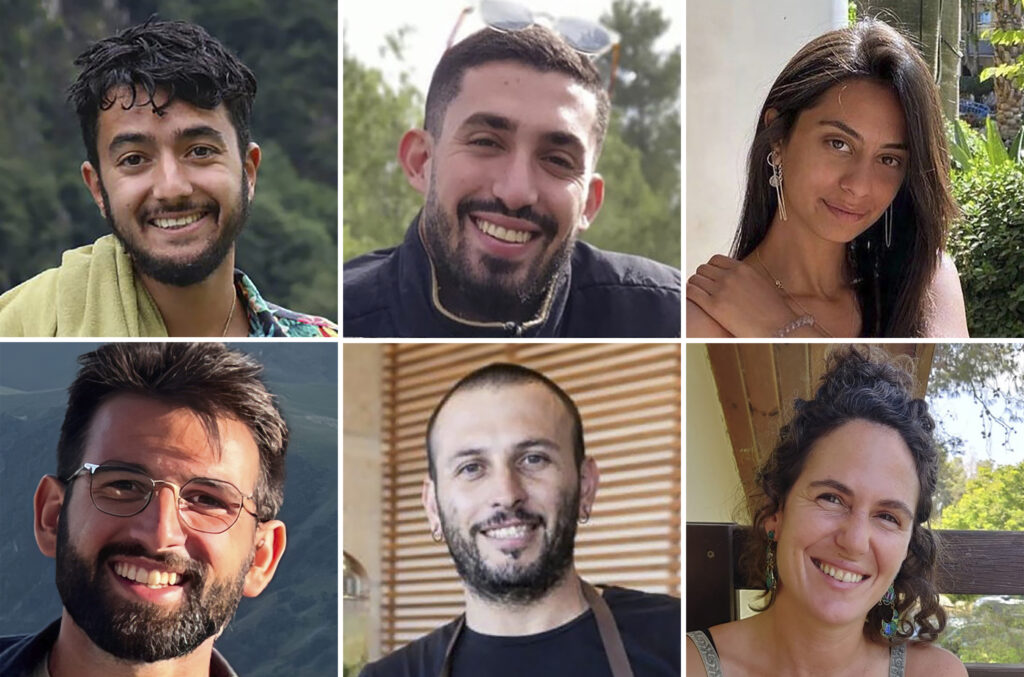Grieving Israelis Take to the Streets Demanding Cease-Fire With Terrorists Who Murdered Six Hostages in ‘Cold Blood’
Israel’s largest trade union, the Histadrut, is calling for a general strike for Monday, the first since the October 7 Hamas attack that started the war.

Tens of thousands of grieving and angry Israelis surged into the streets of Tel Aviv Sunday night after six more hostages were murdered by Hamas at Gaza, chanting “Now! Now!” as they demanded that Prime Minister Netanyahu reach a cease-fire with the terrorists to bring the remaining captives home.
The mass outpouring appeared to be the largest such demonstration in 11 months of war and protesters said it felt like a possible turning point, although the country is deeply divided.
Israel’s largest trade union, the Histadrut, further pressured the government by calling a general strike for Monday, the first since the October 7 Hamas attack that started the war. It aims to shut down or disrupt major sectors of the economy, including banking, health care and the country’s main airport.
Cease-fire negotiations have dragged on for months. Some blame Mr. Netanyahu for failing to reach a deal, which opinion polls show a majority of Israelis favor. But the prime minister also has significant support for his strategy of “total victory” against Hamas, even if a deal for the hostages has to wait.
Thousands of people, some of them weeping, gathered Sunday night outside Mr. Netanyahu’s office at Jerusalem. In Tel Aviv, hostages’ relatives marched with coffins to symbolize the toll.
“We really think that the government is making these decisions for its own conservation and not for the lives of the hostages, and we need to tell them, ‘Stop!'” said Shlomit Hacohen, a Tel Aviv resident.
Three of the six hostages found dead by Israeli forces Saturday — including an Israeli-American — were reportedly scheduled to be released in the first phase of a cease-fire proposal discussed in July, and this only added to the sense of fury and frustration among the protesters.
“Nothing is worse than knowing that they could have been saved,” said Dana Loutaly. “Sometimes it takes something so awful to shake people up and get them out into the streets.”
The military said all six hostages were killed shortly before Israeli forces arrived. “Whoever murders hostages doesn’t want a deal,” Mr. Netanyahu said, blaming Hamas for the stalled negotiations and saying the terrorists would be held accountable for killing the hostages in “cold blood.”
One hostage was Israeli-American Hersh Goldberg-Polin, 23, a native of Berkeley, California, who lost part of his left arm to a grenade in the attack. In April, a Hamas-issued video showed him alive.
The army identified the others as Ori Danino, 25; Eden Yerushalmi, 24; Almog Sarusi, 27; Alexander Lobanov, 33; and Carmel Gat, 40.

The Israeli Health Ministry said autopsies had determined the hostages were shot at close range and died on Thursday or Friday. The army said the bodies were recovered from a tunnel in the southern Gaza city of Rafah, about a half-mile from where another hostage was rescued alive last week.
A military spokesman, Lieutenant Colonel Nadav Shoshani, said Israeli forces found the bodies several dozen yards underground as “ongoing combat” was underway, but that there was no firefight in the tunnel itself. He said there was no doubt Hamas had killed them.
Hamas has offered to release the hostages in return for an end to the war, the withdrawal of Israeli forces from Gaza and the release of a large number of Palestinian prisoners, including high-profile militants.
Some analysts said the public outcry over the six murdered hostages could signal a new level of political pressure on Mr. Netanyahu.
“I think this is an earthquake. This isn’t just one more step in the war,” said an associate fellow in the International Security Program at Chatham House, Nomi Bar-Yaacov, shortly before Sunday’s protests.
